NTSB – Safer Seas Digest 2020
- Safety Flash
- Published on 21 September 2021
- Generated on 3 February 2026
- IMCA SF 26/21
- 1 minute read
Jump to:
The National Transportation Safety Board (NTSB) of the United States has published its SAFER SEAS Digest 2020, being lessons learned from marine accident investigations
What happened?
The NTSB determines the probable cause of the accidents and issues safety recommendations aimed at preventing future accidents.
The digest covers lessons learned from 42 maritime accidents involving contact with fixed objects, sinkings, collisions, fires, explosions, flooding, groundings, and capsizings. The safety issues categorised include:
- procedures and effective communication
- fatigue
- crew training
- voyage planning and dynamic risk assessment, vessel speed
- smoke detection, storage of flammable or combustible materials, closing ventilation inlets during a fire
- lithium-ion battery hazards
- navigating through bridges, operating in high-water/high-current conditions
- effective hull inspection and maintenance, inspection of control linkages.

The contents include reports on the investigations into:
- 18 cases of vessels inappropriately contacting the quay or other fixed structure
- 8 collisions
- 6 fires or explosions
- 4 flooding incidents
- 2 groundings, and
- equipment and machinery failure.
Also covered is the sinking of the Liftboat Kristin Faye.
IMCA Safety Flashes summarise key safety matters and incidents, allowing lessons to be more easily learnt for the benefit of the entire offshore industry.
The effectiveness of the IMCA Safety Flash system depends on the industry sharing information and so avoiding repeat incidents. Incidents are classified according to IOGP's Life Saving Rules.
All information is anonymised or sanitised, as appropriate, and warnings for graphic content included where possible.
IMCA makes every effort to ensure both the accuracy and reliability of the information shared, but is not be liable for any guidance and/or recommendation and/or statement herein contained.
The information contained in this document does not fulfil or replace any individual's or Member's legal, regulatory or other duties or obligations in respect of their operations. Individuals and Members remain solely responsible for the safe, lawful and proper conduct of their operations.
Share your safety incidents with IMCA online. Sign-up to receive Safety Flashes straight to your email.